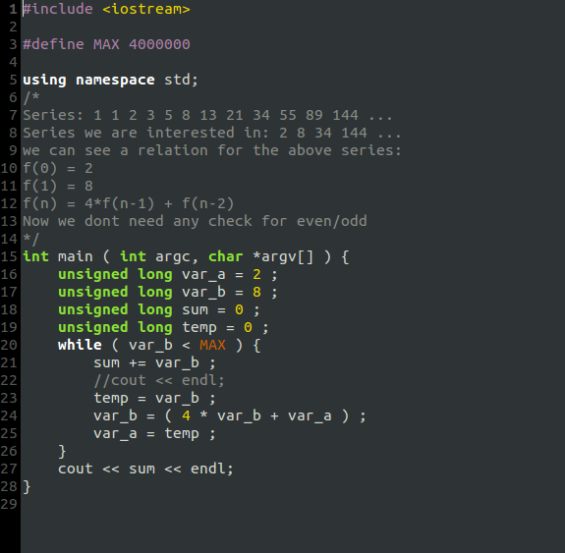Special Pythagorean triplet
A Pythagorean triplet is a set of three natural numbers, a ![]() b
b ![]() c, for which,
c, for which,
For example, 32 + 42 = 9 + 16 = 25 = 52.
There exists exactly one Pythagorean triplet for which a + b + c = 1000.
Find the product abc.
/*
Author : Sreejith Sreekantan
Description :
Special Pythagorean triplet
Problem 9
A Pythagorean triplet is a set of three natural numbers,
a < b < c, for which, a2 + b2 = c2
For example, 32 + 42 = 9 + 16 = 25 = 52.
There exists exactly one Pythagorean triplet for which
a + b + c = 1000.
Find the product abc.
Eg: for Pythagorean triplets:
(3, 4, 5 ) (5, 12, 13) (8, 15, 17) (7, 24, 25)
(20, 21, 29) (12, 35, 37) ( 9, 40, 41) (28, 45, 53)
(11, 60, 61) (16, 63, 65) (33, 56, 65) (48, 55, 73)
(13, 84, 85) (36, 77, 85) (39, 80, 89) (65, 72, 97)
(20, 99, 101) (60, 91, 109) (15, 112, 113) (44, 117, 125)
(88, 105, 137) (17, 144, 145) (24, 143, 145) (51, 140, 149)
(85, 132, 157) (119, 120, 169) (52, 165, 173) (19, 180, 181)
(57, 176, 185) (104, 153, 185) (95, 168, 193) (28, 195, 197)
(84, 187, 205) (133, 156, 205) (21, 220, 221) (140, 171, 221)
(60, 221, 229) (105, 208, 233) (120, 209, 241) (32, 255, 257)
(23, 264, 265) (96, 247, 265) (69, 260, 269) (115, 252, 277)
(160, 231, 281) (161, 240, 289) (68, 285, 293)
*/
#include
#include
using namespace std;
void pythagoreanTriplet(unsigned long sum)
{
unsigned long m, n, s=sum;
s /= 2;
unsigned long sqrt_s = sqrt(s);
for (int m = 1; m <= sqrt_s ; ++m)
{
if (s%m==0)
{
n = (s/m)-m;
if (m>n)
{
cout << sum << " : " << pow(m,2)-pow(n,2) << " "
<< 2*m*n << " " << pow(m,2)+pow(n,2) << endl;
}
}
}
}
int main(int argc, char const *argv[])
{
unsigned long sums[] = {12, 30, 40, 56, 70, 84, 90, 126, 132,
144, 176, 182, 1000};
for (int i = 0; i < sizeof(sums)/sizeof(unsigned long); ++i)
{
pythagoreanTriplet(sums[i]);
}
cout << " the end..." << endl;
return 0;
}
